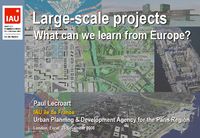Large-scale projects
The analysis of a dozen case studies of large-scale urban development projects conducted by other European metropolises
This presentation was first made on November 2008 at the Thames Gateway Forum in London in the context of the economic crisis starting to affect real estate in the Thames Gateway. Looking at the role of public developers in Europe may help finding new ways to secure sustainable development in situations of weak housing or business markets. The lecture draws upon lessons learned by observing over a dozen cases of large-scale projects and spatial strategies in Amsterdam (Zuidas, Ijburg), Barcelona (22@), Copenhagen (Orestad), Genova (Porto Antico), Malmö (Västra Hamnen), Stockholm (Hammarby), Paris (Plaine Saint Denis, Paris Rive Gauche), and London (Stratford & Lower Lea).
City-regions, which have their own urban planning and design cultures
Two main questions in the presentation: planning and sustainable urban design, both seen as processes. The first point in the discussion is the difference in approaches: the British approach to planning is mostly “reactive” to private sector initiatives, while on the Continent, public authorities are in a more anticipative position. In the UK, urban developments are organized around the needs private investors; on the Continent, planning of the public realm and infrastructure comes usually before; redevelopment goes on even in the (temporary) absence of private sector. The social activity on public space, sometime with temporary structures, is often used as an instrument to put on the map out-of-market locations. In Paris, delivery of the new park of the Batignolles created a social interest in the area years before the first buildings come out; in Amsterdam, a temporary beach was a great driver in the launch a new district; in Nantes, Berlin, Amsterdam or Paris, artists’ intervention are part of the planning and design process.
The contribution of large-scale urban development projects to the issue of sustainable development
Many other lessons can be learned if we want a more sustainable approach to urban redevelopment. For instance: the role of time management in the project (Malmö), the idea of a guideline plan as a living process framework for individual developments (Paris Plaine Saint-Denis), the need for small scale parcels, porosity of street layout to help integrate projects into their environment (Barcelona, Paris Rive Gauche), the role of bottom-up process in strategic governance (or lack of it), the need for an open public participation starting before any plans are drawn...
This study is linked to the following themes :
International |
Urban planning
